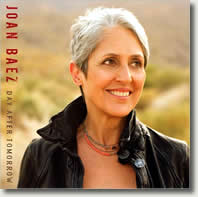Gosh you look older and when did you “get religion?”
Timeless music from Joan Baez
Glancing at Joan Baez’s page on Amazon.com, you have to wonder whether she reads what fans are saying about her new CD Day After Tomorrow. In today’s digital world, anyone with a computer is a critic/pundit. Amazon encourages customers to buy a CD and “review” it. pparently the release of Day After Tomorrow denotes "the best of times and the worst of times”—to borrow a phrase—for Baez fans.The CD marks Baez’s 50th anniversary as a recording artist. The interesting thing about reading the 30 or so reviews on her Amazon page is that they reveal more about the “critics” than the music on this outstanding CD. The majority are written by “gushers.” They’re the folks who bliss out with the album’s first notes. They head their reviews with lines like: “Joan Baez—My Hero.” These are the folks who “got” Baez back when she was a barefoot teenager performing for adoring throngs in crowded in Greenwich Village clubs.
But 50 years later, some fans aren’t ready for the evolving Baez. And they aren’t cutting the folk/pop icon any slack—especially for the sin of “getting old.”
You see the CD cover for Day After Tomorrow shows Joan Baez with a short haircut and yes— gray hair. One critic rewards Baez for her candor with the header, “She’s Definitely Lost Her Looks.” But Baez takes the majority of negative hits for working with “alternative-country-music bad boy” Steve Earle as the producer for the new CD.
It’s apparent that many Baez fans haven’t been keeping up with the developments in Americana music for the past 20 years. While they were still basking in the slick/sweet production of the Baez mega-hit Diamonds & Rust they missed the movement toward “keeping it real” that’s taken hold for many folk-oriented artists.
Consequently, on Day After Tomorrow there aren’t many “sweetening touches,” and the production comes closer to sounding like what you might hear in your living room if Baez came over to run through a few tunes. In fact, the best song on the CD, “Jericho Road,” consists of just Baez’s voice, handclaps and occasional back-up voices. And these voices aren’t even that good—we’re not talking about an African-American gospel choir here.
But this song, written by Earle, will stick with you.
It depicts a person walking to heaven and passing by relatives who’ve “passed” before them. This song is “timeless” in the true sense of the word. Baez’s voice and the song’s arrangement make “Jericho Road” sound like it could have been written in 1808, 1908 or 2008. Like they say, some things don’t change in terms of dealing with death—ours and those near us.
Actually, some of Baez’s critics are shocked by the spiritual turn her music has taken. One disapproving wag estimated that 30 percent of the material on this CD, which is slightly over 37 minutes, is “religious in nature.”
Imagine that. You get a few years on you and it becomes clear you won’t be “forever young”—to borrow another phrase. The best example is “God Is God,” which was written by Earle. A lot of the lines in the song and its general tilt sound like they came out of Earle’s own “12-step-experience.”
The lyrics are framed by minimalist guitars and dobro as Baez ruminates about what real faith is all about. In short, the song says the world abounds with miracles and prophecies, but it all comes down to the more simple fact that “Every day is another chance to get it right.”
To deliver this type of message, a song shouldn’t be resplendent in “studio tricks” that dress it up for the airwaves. Baez knows this message only makes sense when you deliver it simply and directly as if you were talking to a friend.
Of course some of her Amazon pundits aren’t ready for that approach. One guy laments the “poor sound production” and writes how Baez’s soaring soprano is gone—50 years later, and she’s lost an octave—we should all be so lucky to have as beguiling a voice as graces this CD.
But that’s the dilemma Baez faces head on Day After Tomorrow. Maybe it’s her folk roots, but she is not going the “Cher route”—musically or with plastic surgery. So if you’re over 40 or so, you might use this CD as a “reality check” on how you’re dealing with the aging process.
Here’s the test. You may be having some troubles dealing with the aging process, if Day After Tomorrow causes you to think…
- Baez should have hired the type of producers who process the hits for Beyoncé or Britney Spears.
- Baez should have opted for different album art that would have played down her wrinkles.
- Baez needs to go back to the more ethereal sound on early albums—those things that put music on something called vinyl.
If you answer “yes” to any of the above, you’re probably the type of person who goes to your class reunions and thinks to yourself, “Boy ‘so & so’ sure has aged. I’m glad that hasn’t happened to me.”
But if your answers are “no,” you should click on over to CD and check it out. You’ll find a very talented, kindred spirit.
Copyright ©2008 Ben Bowen King
Musician and writer Ben Bowen King recently released A Laying on Of Songs in conjunction with explorefaith’s Days of Grace series of podcasts.
